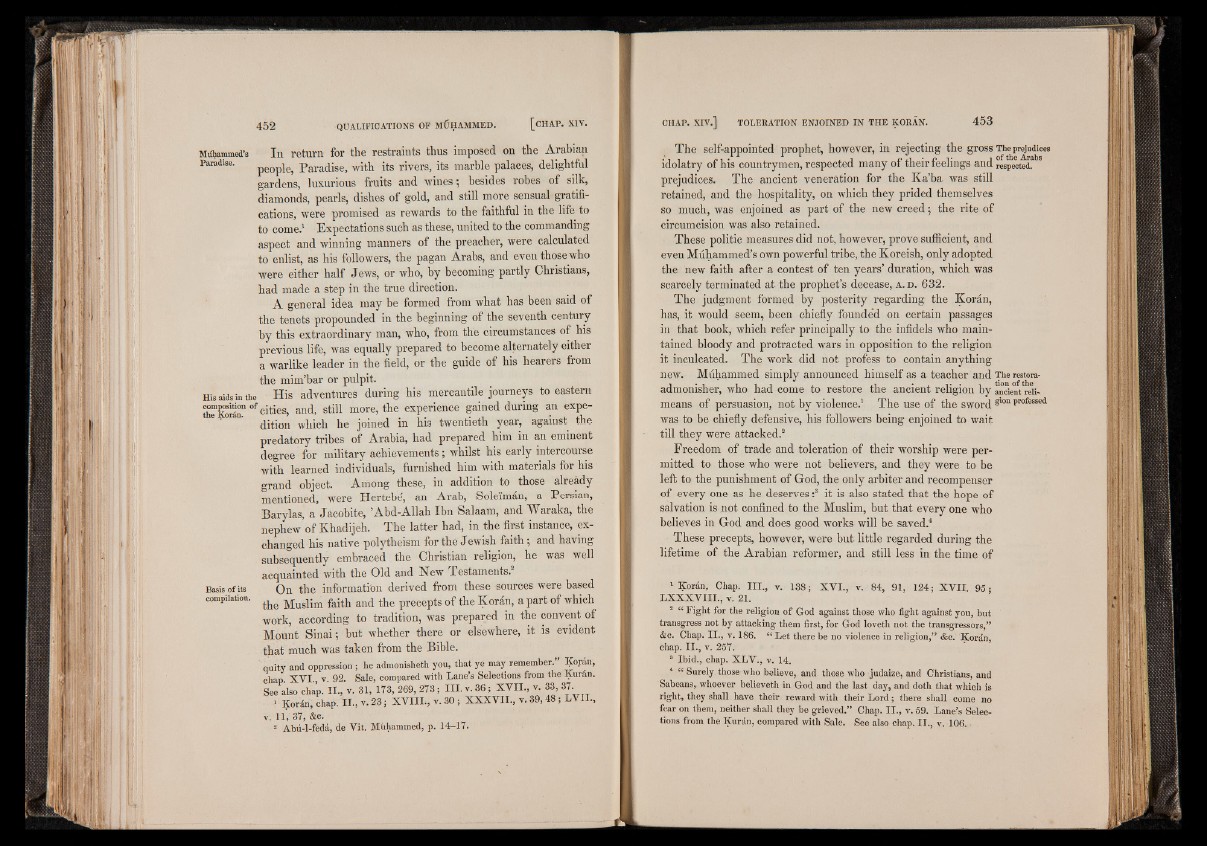
Muhammed’s In return for the restraints thus imposed on the Arabian
Paradise. people, Paradise, with its rivers, its marble palaces, delightful
gardens, luxurious fruits and wines; besides robes of silk,
diamonds, pearls, dishes of gold, and still more sensual gratifications,
were promised as rewards to the faithful in the life to
to come.1 Expectations such as these, united to the commanding
aspect and winning manners of the preacher, were calculated
to enlist, as his followers, the pagan Arabs, and even those who
were either half Jews, or who, by becoming partly Christians,
had made a step in the true direction.
A general idea may be formed from what has been said of
the tenets propounded in the beginning of the seventh century
by this extraordinary man, who, from the circumstances of his
previous life, was equally prepared to become alternately either
a warlike leader in the field, or the guide of his hearers from
the mim’bar or pulpit.
His aids in the His adventures during his mercantile journeys to eastern
cities, and, still more, the experience gained during an expedition
which he joined in his twentieth year, against the
predatory tribes of Arabia, had prepared him in an eminent
degree for military achievements; whilst his early intercourse
with learned individuals, furnished him with materials for his
grand object. Among these, in addition to those already
mentioned, were Hertebe, an Arab, Soleiman, a Persian,
Barylas, a Jacobite, ’Abd-Allah Ibn Salaam, and Waraka, the
nephew of Khadijeh. The latter had, in the first instance, exchanged
his native polytheism for the Jewish faith; and having
subsequently embraced the Christian religion, he was well
acquainted with the Old and New Testaments.2
Basis o f its On the information derived from these sources were based
compilation. ^ Muslim faith and the preCepts of the Koran, a part of which
work, according to tradition, was prepared in the convent of
Mount Sinai; but whether there or elsewhere, it is evident
that much was taken from the Bible.
quity and oppression ; he admonisheth you, that ye may remember, l^oran,
chap X V I v 92. Sale, compared with Lane’s Selections from the Kur&n.
See also chap. I I ., v. 31, 173, 2 6 9 ,2 7 3 ; I I I . v. 3 6 ; X V I I ., v. 33, 37.
\ Kordn, chap. I I , v. 23 ; X V I I I , v. 30 ; X X X V I I , v. 39, 48 ; L V I I ,
v. 11, 37, &c.
2 Abu-l-feda, de Vit. Muhammed, p. 14-17.
The self-appointed prophet, however, in rejecting the gross The prejudices
idolatry of his countrymen, respected many of their feelings and respected^ *
prejudices. The ancient veneration for the Ka’ba was still
retained, and the hospitality, on which they prided themselves
so much, was enjoined as part of the new creed; the rite of
circumcision was also retained.
These politic measures did not, however, prove sufficient, and
even Muhammed’s own powerful tribe, the Koreish, only adopted
the hew faith after a contest of ten years’ duration, which was
scarcely terminated at the prophet’s decease, a . d . 632.
The judgment formed by posterity regarding the Koran,
has, it would seem, been chiefly founded on certain passages
in that book, which refer principally to the infidels who maintained
bloody and protracted wars in opposition to the religion
it inculcated. The work did not profess to contain anything
new. Muhammed simply announced himself as a teacher and The restora-
admonisher, who had come to restore the ancient religion by ancient*reH-
means of persuasion, not by violence.1 The use of the sword 61011 Professed
was to be chiefly defensive, his followers being enjoined to wait
till they were attacked.2
Freedom of trade and toleration of their worship were permitted
to those who were not believers, and they were to be
left to the punishment of God, the only arbiter and recompenser
of every one as he deserves :3 it is also stated that the hope of
salvation is not confined to the Muslim, but that every one who
believes in God and does good works will be saved.4
These precepts, however, were but little regarded during the
lifetime of the Arabian reformer, and still less in the time of
1 Koran, Chap. I I I ., v. 138; X V I., v. 84, 91, 124; X V II. 9 5 ;
L X X X V I I I ., v. 21.
2 “ Fight for the religion o f God against those who fight against you, but
transgress not by attacking them first, for God loveth not the transgressors,”
&c. Chap. I I ., v. 186. “ Let there be no violence in religion,” &c. Koran,
chap. I I ., v. 257.
8 Ibid., chap. X LV ., v. 14.
* “ Surely those who believe, and those who judaize, and Christians, and
Sabeans, whoever believeth in God and the last day, and doth that which is
right, they shall have their reward with their L o rd ; there shall come no
fear on them, neither shall they be grieved.” Chap. I I ., v. 59. Lane’s Selections
from the Kurdn, compared with Sale. See also chap. I I ., v. 106. ■